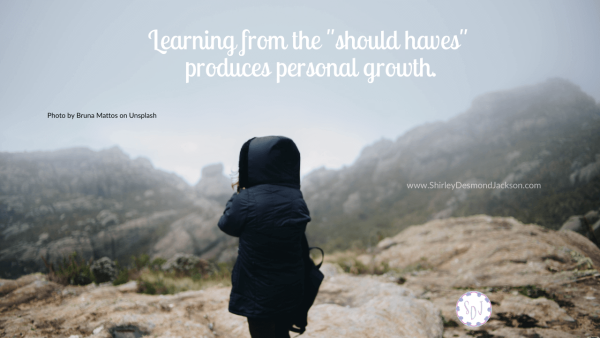
Subscribe to receive a FREE Bible Study!
Share this page

When The “Should Haves” Accuse
March 4, 2021
With a sinking heart I watched as the amount owed multiplied before my eyes. How could this have happened? I should have known better!
As we prepared for our move to Virginia, I called the same governmental agency, not once, but three times. Each time a different representative repeated the same advice. Now on the day of reckoning, we learned the unavoidable truth. Their advice grossly understated what we would owe. Paying our debt deeply dented our savings.
Immediately the “should haves” began their relentless attack. All the things I should have asked, should have known, or should have done. Each accusation pushed me deeper in my state of self-contempt.
That’s the problem with the “should haves”. They kick us when we are already down.
Long ago I learned the difference between true guilt and guilty feelings. They don’t always accompany each other.
True guilt defines a condition, not an emotion. Guilt arises when I break a law, even if I didn’t know it existed. In our own judicial system, ignorance of the law can not be used as a valid defense. Unaware of the law, I may be guilty, but experience no guilty feelings.
On the other hand, when I know something is wrong but do it anyway, my conscience produces guilty feelings. But sometimes my conscience goes into overdrive, like it did this week. It creates guilty feelings even though no law was broken.
These principles hold true with God’s law as well. Thankfully, He has answers for us when we fall under the attack of the “should haves”.
Godly sorrow brings repentance that leads to salvation and leaves no regret, but worldly sorrow brings death. See what this godly sorrow has produced in you: what earnestness, what eagerness to clear yourselves, what indignation, what alarm, what longing, what concern, what readiness to see justice done. At every point you have proved yourselves to be innocent in this matter. (2 Corinthians 7:10-11 NIV)
These verses, taken from the Apostle Paul’s second letter to the Corinthian church, refer to a sinful situation he had confronted earlier. Although his first letter had caused the Corinthians sorrow, Paul did not regret it because their sorrow led them to repentance. (2 Corinthians 7:8-9)
In this passage, Paul contrasted two types of sorrows: godly and worldly. The Greek word for repentance, metanoia, means a change of mind which results in a reversal of action. Repentance leads to times of refreshment from the Lord. (Acts 3:19) The guilty feelings arising from godly sorrow led the Corinthians closer to God.
In contrast, Paul described worldly sorrow which leads to death. The Greek word for death, thanatos, when used figuratively, means a separation from the salvation of God. In essence, worldly sorrow pushes us away from God.
I’ve always thought of worldly sorrow as being sorry, but not enough to change. Some describe it as remorse over being caught, but not sorry for the act itself. But when I think of a sorrow pushing me away from God, I need to include the guilty feelings brought on by the accusatory “should haves”.
When I berate myself with all the “should haves”, I find myself feeling more and more distant from God. Oddly enough, in these situations repentance will move me forward and allow me to experience moments of refreshment.
But this time the mind change comes, not because I did something wrong, but because I didn’t know what to do right. As the saying goes, sometimes you just don’t know what you don’t know. My future behavior will change because now I know more.
I love how Maya Angelou puts it:
I did then what I knew how to do. Now that I know better, I do better.
As I continue down the road, I know the “should haves” will continue to attack. When they do, I pray to repent of the not knowing, to learn from the experience and then enjoy times of refreshment. Wherever the road leads you, I pray you can do the same.
When The “Should Haves” Accuse
March 4, 2021

With a sinking heart I watched as the amount owed multiplied before my eyes. How could this have happened? I should have known better!
As we prepared for our move to Virginia, I called the same governmental agency, not once, but three times. Each time a different representative repeated the same advice. Now on the day of reckoning, we learned the unavoidable truth. Their advice grossly understated what we would owe. Paying our debt deeply dented our savings.
Immediately the “should haves” began their relentless attack. All the things I should have asked, should have known, or should have done. Each accusation pushed me deeper in my state of self-contempt.
That’s the problem with the “should haves”. They kick us when we are already down.
Long ago I learned the difference between true guilt and guilty feelings. They don’t always accompany each other.
True guilt defines a condition, not an emotion. Guilt arises when I break a law, even if I didn’t know it existed. In our own judicial system, ignorance of the law can not be used as a valid defense. Unaware of the law, I may be guilty, but experience no guilty feelings.
On the other hand, when I know something is wrong but do it anyway, my conscience produces guilty feelings. But sometimes my conscience goes into overdrive, like it did this week. It creates guilty feelings even though no law was broken.
These principles hold true with God’s law as well. Thankfully, He has answers for us when we fall under the attack of the “should haves”.
Godly sorrow brings repentance that leads to salvation and leaves no regret, but worldly sorrow brings death. See what this godly sorrow has produced in you: what earnestness, what eagerness to clear yourselves, what indignation, what alarm, what longing, what concern, what readiness to see justice done. At every point you have proved yourselves to be innocent in this matter. (2 Corinthians 7:10-11 NIV)
These verses, taken from the Apostle Paul’s second letter to the Corinthian church, refer to a sinful situation he had confronted earlier. Although his first letter had caused the Corinthians sorrow, Paul did not regret it because their sorrow led them to repentance. (2 Corinthians 7:8-9)
In this passage, Paul contrasted two types of sorrows: godly and worldly. The Greek word for repentance, metanoia, means a change of mind which results in a reversal of action. Repentance leads to times of refreshment from the Lord. (Acts 3:19) The guilty feelings arising from godly sorrow led the Corinthians closer to God.
In contrast, Paul described worldly sorrow which leads to death. The Greek word for death, thanatos, when used figuratively, means a separation from the salvation of God. In essence, worldly sorrow pushes us away from God.
I’ve always thought of worldly sorrow as being sorry, but not enough to change. Some describe it as remorse over being caught, but not sorry for the act itself. But when I think of a sorrow pushing me away from God, I need to include the guilty feelings brought on by the accusatory “should haves”.
When I berate myself with all the “should haves”, I find myself feeling more and more distant from God. Oddly enough, in these situations repentance will move me forward and allow me to experience moments of refreshment.
But this time the mind change comes, not because I did something wrong, but because I didn’t know what to do right. As the saying goes, sometimes you just don’t know what you don’t know. My future behavior will change because now I know more.
I love how Maya Angelou puts it:
I did then what I knew how to do. Now that I know better, I do better.
As I continue down the road, I know the “should haves” will continue to attack. When they do, I pray to repent of the not knowing, to learn from the experience and then enjoy times of refreshment. Wherever the road leads you, I pray you can do the same.

Recent Comments